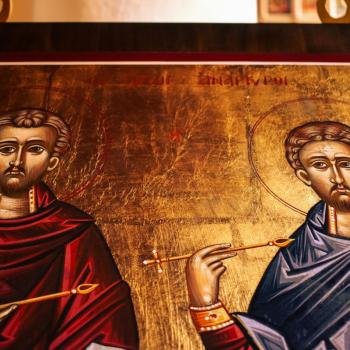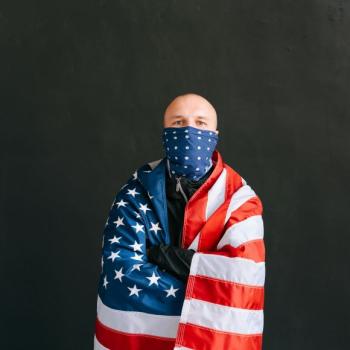 God Not in the Abuse of Hagar and Neither Is the Bible
God Not in the Abuse of Hagar and Neither Is the Bible
Too much of American Christian culture breathes a white, toxic masculinity. This heteronormative, male dominated system even manages to involve women in the abuse of power. Sarah represents every conservative evangelical woman who upholds, defends, and supports the structure of male toxicity. The story of Hagar moves with shift-shaping swiftness, across time and space; its explosions may seem disconnected from each other. They are not. This violence shares a fundamental kinship with Abraham and Sarah in the systemic abuse that exists in all male-dominated Christian institutions. As it was with Abraham and Sarah, so it is today with men and women caught in violence and abuse.
When we figure violence as alien to our alleged superior ethical consciousness, we ignore the harsh reality that even our churches are built on violence rather than reason. We need for the cries of Hagar to be heard as the cries of women today. We need to name, identify, and condemn rhetorical tropes that conceal and enable repetitive exclusions and abuses.
My sweet Jesus, what an awful text. Reading the mistreatment of Hagar and Ishmael raises questions about the Bible, questions we must face before we can even look this text of terror in the eye. A man sends the mother of his first-born son and the son into the wilderness to face an almost certain death.
A Text of Terror
Theologian Phyllis Trible calls the story of Hagar a text of terror. Hagar, also known as “the slave woman,” faces abuse, rejection, and violence. So, with that in mind, we consider the threesome of Abram, Sarah, and Hagar – a biblical Ménage à trois.
As Professor Trible points out, Sarah was Hebrew, married, rich, and free; Hagar was Egyptian, single, poor, and enslaved. Sarah was older and barren. Hagar was younger and fertile (Phyllis Trible, Texts of Terror, p. 10). And these differences played themselves out as the relationship between the two was broken by issues of threat and power, abuse, and mistrust. There are always people with power and people with no power. There are always people with privilege and people with none. The denial of privilege is not the eradication of privilege. If we are white, rich, free – we are privileged for centuries piled on top of centuries; privileges piled on the dead, dry bones of other civilizations of people of other colors; privileged and blind as bats to the privilege.
An Act of Abuse
And so, in one of the harshest scenes of the Bible, Sarah orders Abraham to banish Hagar and Ishmael into the wilderness. Out of her own sense of powerlessness and precarity, Sarah orders a death sentence for Hagar and Ishmael. “Throw her out” may seem harsher than “Lock her up,” but the two slogans originate in the same poison well. Abraham gives the order, but Sarah pulls the strings.
The abuse was so awful that Hagar ran away into the desert with her baby. In that encounter, Hagar becomes the first person in Scripture to give God a name. She calls God “El-roi,” or “the God who sees.” Hagar, a slave woman, becomes the first one in our collective holy story to give God a name. Hagar calls God by name. The abuse is not God’s doing.
Others Also Call God by Name
If you engage in discriminating practices against others, no matter how much you think they may be wrong, do you realize that they also call on the name of God? I think it is a form of blindness, that we can’t see that everyone in the universe is in a relationship with God, without our righteous permission. Do we not know that the immigrants at our borders know the name of God, call on the name of the Lord, cry out to God to save their children?
God Is Not in the Abuse
The story claims God approved it; God signed the executive order expelling Hagar and son to the wilderness. God said send them back to Mexico. God said send them back to Africa. God said it, that’s what the Scripture says. When the noise of our self-righteousness drowns out the cries of the oppressed, we should know we are in trouble. Nothing is more offensive than hiding our mistreatment of others behind the will of God. God did not do this. An innocent God has been framed and even a junior grade Bible detective can show that the evidence points at us and not at God. Sarah and a complicit Abraham did this. Isaac and Ishmael, a childhood friendship now fractured into an unending animosity that has never ended.
But the story is only creating drama, the tension in the moment. This is not God’s doing. These are words of interpretation that often appear in the Old Testament. God’s real response will come later, and it will not be a response of exclusion. The writer of Genesis knew the true nature of God and understood that God would not desert Hagar and the child. Wait for it. God is not a signatory to the abuse of Hagar. This is not God’s doing.
God Hears the Cries of All the Hagars in the World
Look, you can run down any group, any race, any religion, you wish, but you can’t keep them from the grace of God. You can pout, like Jonah, when God saves Nineveh, but you can’t deny the love of God for the world. You can pretend that your brand of Christianity is superior to all others and to all other religions, but you can’t stop people from calling on the name of the Lord. When you shut some group out from the grace of God, it doesn’t mean that God is part of your judgment.
Contrast the Christians who call others demeaning, judging, condemning names with the Others calling God by name. God especially hears the cries of oppression. Those awful cries are all over the Bible.
The God Who See Is Also the God Who Hears
God hears the cries of Ishmael and Hagar: She lifted up her voice and wept. And God heard the voice of the boy; and the angel of God called to Hagar from heaven, and said to her, ‘What troubles you, Hagar? Do not be afraid; for God has heard the voice of the boy where he is. Come, lift up the boy and hold him fast with your hand, for I will make a great nation of him.’ Then God opened her eyes, and she saw a well of water. She went, and filled the skin with water, and gave the boy a drink.”
The divine presence of Love, the subversive holy presence, is too powerful to be kept covered by the gritty ash of abuse, and even in the middle of this text of terror, they break free and rise. God’s presence rises up in the wilderness. God’s presence rises up out of the brokenness. God’s presence rises up and refuses to play a part in the story of abuse, in the story of abandonment, in the story of the hell we can too easily inflict on one another.
We do not have to participate in systems of abuse. God is present in the terror, but God is not a terrorist, doesn’t participate in the abuse but transforms it. What good news.













